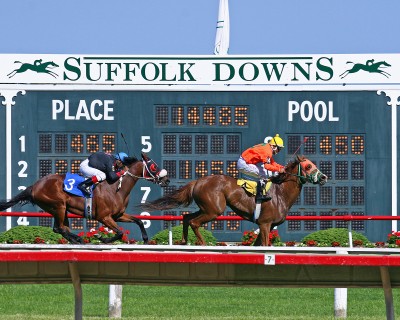
After closing its doors in 2014 after a failed casino development, East Boston racetrack Suffolk Downs opened its doors Saturday to host the first of three race days amid supporters’ efforts to expand gambling.
One of the 22 petitions certified by Massachusetts Attorney General Maura Healey for the 2016 election ballot includes “An Act Relative to Expanded Gaming,” which would allow the Massachusetts Gaming Commission to permit a place to gamble near a race track like Suffolk Downs. The petition is not filed through the MGC.
James Dana, a professor at Northeastern University, said casinos tend to improve the economic well-being of an area by bringing in more business.
“Casinos are one form of economic development that creates jobs and brings money and business in, which can have a positive effect on the community,” Dana said. “The kinds of jobs you create are not just in employing at events, or at the casinos, but in marketing, sales, hiring, cleaning, catering, ticket sales. It will raise development and property values.”
When Suffolk Downs initially closed, the Gaming Commission expressed sympathy about the closure.
“[The Massachusetts Gaming Commission] is saddened by the impact discontinuance of live thoroughbred racing at Suffolk Downs will have on the lives of the dedicated men and women who have played a role in racing at the track for many, many years,” a 2014 MGC statement read.
The MGC granted a request to open the racetrack for three days during the fall for a series known as the Suffolk Downs Festival of Racing.
“The Massachusetts Gaming Commission is committed to continuing the tradition of thoroughbred racing in the Commonwealth,” wrote Elaine Driscoll, a spokeswoman for the MGC, in an email.
However, Dana was not without empathy for those living near the racetrack. He acknowledged that negative social effects tend to come along having an open racetrack and a casino.
“These are troubling for a lot of people because they have really negative social effects, such as drugs, prostitution, illegal activities,” Dana said. “The people that are harmed by it are the people who are in the local community.”
Echoing some of these concerns, voters halted the Suffolk Downs’ casino development in a 2013 referendum, The Daily Free Press reported on Nov. 6, 2013. Approximately 56 percent of East Boston voters denied the vote.
Fatima Bensalah, 30, of East Boston, said she is against the construction of a casino at Suffolk Downs because, to her, the negatives outweigh the positive effects.
“I’m against it because, even if they say it will create a lot of jobs, those jobs are not going to help the city if we get a lot of gambling and people losing their money and becoming addicted to gambling,” she said. “It would just spark a lot of crime. We need healthy people. We don’t need sick people. We don’t need people who are going to be sucked into an addiction.”
However, other residents felt differently and said that everyone should have the right to take part in recreation freely.
Robert Burke, 59, of South Boston, said everyone should be able to unwind in their own way.
“Suffolk Downs is only supposed to be open something like, one day out of the month,” he said. “That will give people time for themselves and people around here need that. It’s just a way to relax and do something fun.”
Jurell Benton, 29, of East Boston, said people have the right to gamble if they choose.
“I don’t have any problem with it. I’d rather have it open. I’m all about freedom and everyone can have the freedom and everyone can have the freedom to gamble,” he said. “I mean, if you don’t like it, then don’t do it, but everyone can have the right to if they want to.”




















































































































